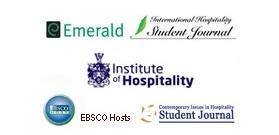Following trends is important in the hospitality and tourism industry, therefore the 18th International Hospitality and Tourism Research Conference addressed the topics of millennials, technology and industrial developments over the two-day period from the 27th to the 28th April 2017. The conference addressed the main theme of “Making a difference in hospitality and tourism practice”, which focused on contributions of managers and leaders to an ever-changing landscape within the hospitality and tourism industry and a tapestry of issues they might need to face in the future.
Over the two days, the conference brought together leading researchers from across Europe, HTMi faculty and HTMi students, to discuss issues facing hospitality and tourism. Contributions were made by participants from over thirty nationalities.
On the first day, four presentations and two workshops were delivered by invited keynote speakers and guest presenters. Mr Cédric Michiels (Independent Consultant) introduced the audience to the three digital dimensions that influence the hospitality industry to a major extent: digital marketing, mass collaboration and big data. After discussing the advantages and disadvantages of the rapid development in the digital marketing world and providing examples of the collaborative economy and its impacts on the industry, future prospects and requirements were discussed in relation to the handling of the enormous data that is now available to hoteliers.
Next, Mrs Diana Bryden of Skills Development Scotland, invited speaker presented an informative summary of the fourth industrial revolution and its implications for the hospitality industry. Creativity, soft skills and adaptation were highlighted as the most important skills which can enhance the ultimate collaboration that is needed between humans and technology.
Ms Ekaterina Kuzina and Ms Maria Trofimova (HEM Intelligence) reviewed the dos and don’ts of hotel operations during major international events. They engaged the audience with very tangible, real-life examples as well as drawing attention to challenges such as intercultural communication.
Opening the afternoon session, Mr Andy Heyes (Institute of Hospitality) introduced research on the future of the luxury sector in hospitality and tourism. In an era dictated by millennial customers, personalisation, and transition from ‘old’ to ‘new’ luxury, the industry needs to reevaluate the meaning of the luxury experience.
In the latter part of the first day, two workshops were held: Survey design by Mrs Diana Bryden; and Brand and product management by Mr Cédric Michiels. These sessions provided valuable information to all young aspiring researchers for their own projects and studies.
The second day of the conference was opened by Mr Ian Bickerstaff (Ulster University), who explored the possibilities presented by social media in the case of the small business sector. This presentation also rounded up earlier discussions on millennials, technological change and opportunities which had been proposed earlier speakers.
The remainder of the day was dedicated to HTMi student presentations, exploring aspects of emotional intelligence, cultural difference, leader-follower relationships in the hospitality industry, the role of CSR, experience creation and tourism development, just to mention a few. These papers reflected the ongoing quality and diversity of hospitality, leadership, change management, tourism and educational research, which HTMi sponsors to assist the industry.
Overall, the conference was an inspiring and thought-awakening event and provided many opportunities for discussion and networking among invited guests, HTMi faculty and students. The 19th IHTRCS Conference will take place in November 2017.

